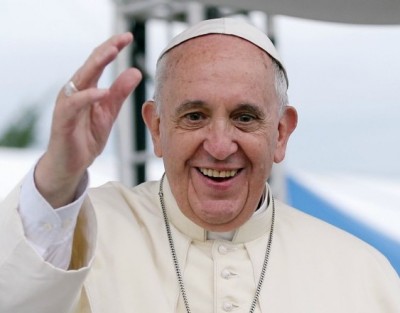
By LUCAS WANG
Staff Writer
The 266th Pope, Francis, has been the most progressive Pope in recent history. He has made significant overhauls to the Catholic doctrine and has urged Catholics to dedicate themselves more to the core values of Christianity: love and forgiveness.
His latest push came in a 256 paged document entitled Amoris Laetitia, or “The Joy of Love,” which focused largely on marriage and clarifications of the Catholic Church’s current stance on it. In this document, Pope Francis urged priests and parishioners to be more lenient when conducting communion and asked them to allow divorced Catholics to partake in the ceremony.
Throughout the document, however, Francis seemed to skirt the topic of divorce, never asking to officially change the Church’s rules or to exempt divorced Catholics from their sin, and his reluctance to do so is not without reason. The Bible often emphasizes the sanctity of marriage and states that the violation of marriage through divorce (unless under special conditions) is a clear violation of Church law and is equivalent to adultery.
The reason that divorcees are restricted from communion is grounded in the Catholic belief that communion is a sacred ceremony performed only by Catholics who fulfill three main requirements. The first is simple: someone who wishes to partake must have been baptized. The second and third are slightly more convoluted. A Catholic must not commit any premeditated mortal sin. If he or she has committed a sin, he or she must repent before partaking in communion. Because divorce is considered adultery, and thus a mortal sin, divorcees are not to partake in communion.
Therefore, if Pope Francis were to allow divorcees to participate in communion, he would be going directly against the traditions and teachings of the Church. As such, his actions are completely in line with Catholicism. Pope Francis is simply encouraging priests to be more lenient in enforcing specific traditions – something that is completely within his power, and even duty, as Pope.



Sword & Shield
Menu
Divorce and communion: why the Pope’s seeming inaction is appropriate
April 19, 2016

2014 Pastoral Visit of Pope Francis to Korea
Closing Mass for Asian Youth Day
August 17, 2014
Haemi Castle, Seosan-si, Chungcheongnam-do
Ministry of Culture, Sports and Tourism
Korean Culture and Information Service
Korea.net (www.korea.net)
Official Photographer : Jeon Han
This official Republic of Korea photograph is being made available only for publication by news organizations and/or for personal printing by the subject(s) of the photograph. The photograph may not be manipulated in any way. Also, it may not be used in any type of commercial, advertisement, product or promotion that in any way suggests approval or endorsement from the government of the Republic of Korea. If you require a photograph without a watermark, please contact us via Flickr e-mail.
—————————————————————
교황 프란치스코 방한
제6회 아시아 청년대회 폐막미사
2014-08-17
충청남도 서산시 해미읍성
문화체육관광부
해외문화홍보원
코리아넷
전한
Story continues below advertisement
Leave a Comment
Donate to Sword & Shield
$55
$1000
Contributed
Our Goal
Your donation will support the student journalists of University High School. Your contribution will allow us to purchase equipment and cover our annual website hosting costs.
More to Discover
The Official News Publication of University High School in Irvine, California












